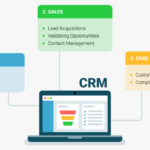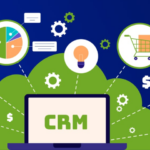The right CRM makes it easy to synchronize the functions of different departments, making it convenient to manage any company. The company should, however, keep track of the performance of the various campaigns to know whether or not the implemented CRM is a success. The best way to measure CRM’s success is to have a specific indicator of measurable performance. At the commencement of the CRM project, this should be accomplished.
A few metric combinations that might be used to measure the success of CRM software implementation are:
CRM Software is always scanned across marketing, sales, and also customer service features to reduce operational costs. It can lead to a decrease in the volume of the various marketing campaigns, with leads being selected wisely and effectively. In turn, this will result in a decrease in the expense-to-revenue ratio. If the prospecting process is successful, it shortens the sales cycle. Similarly, if the duration of a transaction or problem-solving customer service is shorter, it reduces the cost.
Growth in Revenue – The goal of any business is to look out for ways to reduce operational costs and increase revenue. Cost savings are possible by automating marketing processes.
Customer Service- One of the most essential parts of the business equation is a customer. Post-sales service is therefore of paramount importance in CRM metrics. Key indicators such as employee performance, ticket queue, and ticket analysis can be used to evaluate the problems and formulate strategies for efficient customer handling.
The conversion rate-The frequency of a loyal customer’s conversion of a potential lead is a key CRM metric that allows any company to find out how soon a measurable action is produced by prospect outreach attempts. A thorough analysis of the rate of potential conversion leading to repeat customers helps to understand the effectiveness of current campaigns and strategies. Go for CRM software and speed up your organization’s growth.
Engagement Performance-The marketing team must verify the ratio of potential prospects being contacted to the number of responses. An analysis of the ratio will assist the company to understand its target audience and the necessary actions required following the engagement performance indicators. This also helps in time management, as no potential leader who has not responded despite multiple attempts must be contacted by the sales team.
Any good CRM helps keep track of all your customer touchpoints, and KPIs are measurement benchmarks you can use to ensure high quality and consistent delivery of your service. Developing and analyzing the above-mentioned parameters will help any business to not only retain its existing customers but also attract new prospects. Besides, it also helps to maximize the investment return.






0 Comments